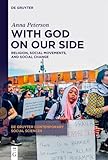With God on Our Side : Religion, Social Movements, and Social Change / Anna Peterson.
Material type: TextSeries: De Gruyter Contemporary Social Sciences ; 33Publisher: Berlin ; Boston : De Gruyter, [2024]Copyright date: 2024Description: 1 online resource (XIII, 229 p.)Content type:
TextSeries: De Gruyter Contemporary Social Sciences ; 33Publisher: Berlin ; Boston : De Gruyter, [2024]Copyright date: 2024Description: 1 online resource (XIII, 229 p.)Content type: - 9783111235363
- 9783111235486
- 9783111235387
- 261.8
- online - DeGruyter
- Issued also in print.
| Item type | Current library | Call number | URL | Status | Notes | Barcode | |
|---|---|---|---|---|---|---|---|
 eBook
eBook
|
Biblioteca "Angelicum" Pont. Univ. S.Tommaso d'Aquino Nuvola online | online - DeGruyter (Browse shelf(Opens below)) | Online access | Not for loan (Accesso limitato) | Accesso per gli utenti autorizzati / Access for authorized users | (dgr)9783111235387 |
Browsing Biblioteca "Angelicum" Pont. Univ. S.Tommaso d'Aquino shelves, Shelving location: Nuvola online Close shelf browser (Hides shelf browser)
Frontmatter -- Acknowledgments -- Contents -- Chapter 1 Introduction: Religion and Social Movements -- Chapter 2 Studying Religion and Social Change -- Chapter 3 Studying Social Movements -- Chapter 4 Religion as a Resource for Social Movements -- Chapter 5 Religion and Social Movement Practices -- Chapter 6 Ideas, Faith, and Commitment: Religious Ideas in Social Movements -- Chapter 7 Individuals and Structures -- Chapter 8 Social Movement Impact and Success -- Chapter 9 Conclusion -- Bibliography -- Index
restricted access online access with authorization star
http://purl.org/coar/access_right/c_16ec
Religion plays a central role in a variety of social movements, including many that are not explicitly faith-based. This book provides the first systematic analysis of the ways religion contributes to diverse movements for social change. It draws on a variety of case studies, from the US and globally, to build an argument about religion’s distinctive capacity to provide logistical support, to inspire and legitimize activist practices, to connect different spatial scales, and to link big ideas to everyday experiences. The book’s analysis rests on three foundational arguments. First and most fundamentally, it is impossible to understand movements for social change without analyzing the multiple ways that religion shapes their ideas, communities, and practices. Second, religion is always in mutually transformative interaction with social and political forces and can never be entirely separated from them. In social movements and in the public sphere more generally, people interpret politics with values and concepts drawn from religion and understand their activism as spiritually meaningful. This challenges the assumption that religion is a largely a private matter. Third, scholars must treat religion as a relatively independent variable, which actively shapes social processes just as it is shaped by them. We cannot make sense of religion’s role in social movements without acknowledging that religious institutions and traditions have, to some extent, a life of their own.
Issued also in print.
Mode of access: Internet via World Wide Web.
In English.
Description based on online resource; title from PDF title page (publisher's Web site, viewed 20. Nov 2024)









